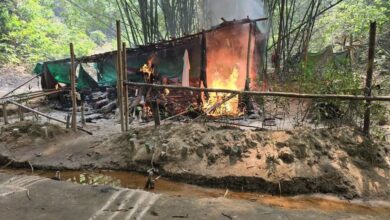
In the suit no KWS/117/2021, ENetSuD dragged the respondents (Kwara State Government, Kwara State Governor and Attorney General of Kwara State) to the State High Court to seek the relief of a declaration that section 29 (1) to (5) of the Kwara State Local Government Law, 2005 is in conflict with section 7(1) of the Constitution of Federal Republic of Nigeria 1999 (as amended) and thus null, void and of no effect whatsoever to the extent that it empowered Governor of Kwara State to dissolve the democratically-elected Local Government councils and replace them with Transitional Implementation Committees/ Caretaker or whatsoever name called appointed by the Governor or any other body.
According to ENetSuD statement made available to national pilot newspaper,the reliefs were seeked before justice H.A Gegele and following are reliefs seeked”A declaration that by virtue of the combined effect of section 7 of the Constitution of Federal Republic of Nigeria 1999 (as amended) and the provisions of section 18 and 28 the Kwara State Local Government Law, 2005 the Governor of Kwara State had no power to dissolve the democratically-elected councils of the sixteen Local Governments of Kwara State.
“A Declaration that 1999 Constitution of Nigeria (as amended) does not recognize the purported Transitional Implementation Committee/ Caretaker or any other name whatsoever called in Kwara State and the creation or appointing of such is therefore unconstitutional.
“A Declaration that the Respondents lack vires to release or use Kwara State resources to fund purported Transitional Implementation Committee/ Caretaker or any other name whatsoever called in view of sections 1(1), 7(1) and 15 (5) of the constitution of Federal Republic of Nigeria 1999 (as amended).
” An Order setting aside the purported appointment of Transitional Implementation Committee by the Kwara State Government of 5th March, 2021 or any other dates whatsoever.
“An Order directing the 2nd Respondent (Kwara State Governor) to recover/refund back to the State Treasury all fund, remunerations and benefits already paid to members of the said Transitional Implementation Committees.
“An Order directing the 2nd Respondent (Kwara State Governor) to conduct local Government election in the whole local government area of Kwara state with immediate effect in accordance with section 7 (1) of the Constitution of Federal Republic of Nigeria, 1999 (as amended). ”
It will be recalled that the Kwara State Government filed an objection to the case of ENetSuD, claiming that ENetSuD lacks the locus stadii to sue the government on the issue relating to appointment of TIC in the 16 LGAs of the State. The first hearing of the case came up on 25th June 2021 at the Kwara State High Court, Ilorin. At the resumed hearing of the case today Friday 30th July, 2021, the court heard arguments for and against the preliminary objection raised by the respondents (Kwara State Government / Governor) and the substantive case. The Attorney General and Commissioner for Justice of Kwara State appeared himself together with some other lawyers from his office on behalf of the respondents while Lukman Raji Esq (ENetSuD’s Director of Legal Services) of Gobir Imam and Co appeared for ENetSuD.
WHAT KWSG SAID
The Court asked the Attorney General of the State to tell the Court who is presently in charge of (what is in place at) the Local Governments in Kwara State. The Attorney General, Salman Jawondo, said the elected LG Council and lawmakers were suspended, not dissolved. The Judge said that he reserves the right to read between the lines and determine what the law says about the action of the government.
When asked if the constitutionally- and legally- recognized council is in place at the moment in the 16 LGAs of Kwara State, the Attorney General said NO but that DPMs are in charge. When asked again, the learned A.G. said it is true the KWSG appointed TIC but it was as a result of doctrine of necessity. He said further that the State could not conduct election because of pending case with Kwara State Independent Electoral Commission (KWASIEC).
The Court asked the Attorney General if there is any law that says TIC must be appointed to oversee the affairs of the Local Governments. The Attorney General repeated the excuse of the pending court case and “doctrine of necessity”.
The Attorney General also said the suspended Local Government Council members were being paid during their suspension, and they would have been the one to take up this matter, rather than ENetSuD that has no interest whatsoever in this case. He insisted that the affected Council members are not the complainant on the case in the Court, and that ENetSuD can’t take up the case it has no interest in.
The Attorney General further maintained that the legal personality of ENetSuD is in doubt, and that the exhibits submitted by ENetSuD are not certified, and thus, not admissible in court.
WHAT ENetSuD SAID
ENetSuD’s Counsel, Lukman Raji Esq., addressed the issue of the Legal personality of ENetSuD that the KWSG raised. He also argued against the position of the Attorney General that ENetSuD’s documents are not Certified True Copies. He said all the authorities relied upon by the Attorney General in this case are not apposite (apt) as the present case is an affidavit evidence-based case.
He said “unlike in other procedures where witness will be in court to give evidence, tender documents, and same admitted as exhibits by the court, affidavit evidence requires not necessarily annexing or attaching the original or Certified True Copy. Ordinary copy of the document is enough since it is just for the information of the Court. There is no procedure for admissibility or tendering of document in an affidavit evidence” he explained.
He also said, assuming without conceding that the practice in an affidavit evidence is to tender and admit documents attached to affidavit, that can only be done at the request of the Court. He urged the Court to so hold.
He said the only situation by which a document attached to an affidavit can be objected to is where the affidavit evidence forms part of another substantive case. He provided the relevant authorities of Court of Appeal decision to justify this argument.
He urged the court to hold that the attached annexures to ENetSuD’s affidavits require no certification before they can be considered by the court.
He added that ENetSuD’s original registration certificate is in its personal custody, and where there is any doubt as to the existence of ENetSuD, the government can make further findings to be properly guided.
WHAT THE COURT SAID
The Court told the 2 parties that irrespective of submissions made, it has the power to make further findings to find out the truth of the matter. “The Court is not stopped from taking judicial notice of certain notorious facts. Aside all the affidavits, counter affidavits filed, annexures and exhibits filed in this case, if I read through and I find the need to call anybody to make any clarification, if I notice anything that does not represent the truth, I will take it further and do the needful”.
The Court emphasized on the seriousness of the case before it and urged counsels to finish the court with all authorities relied upon.
The Court stated that it wants nothing but the truth and urged the Counsels to uphold the truth.
Judgement/ruling on both the preliminary objection and the substantive case was adjourned till a date to be communicated to parties through their counsels.




